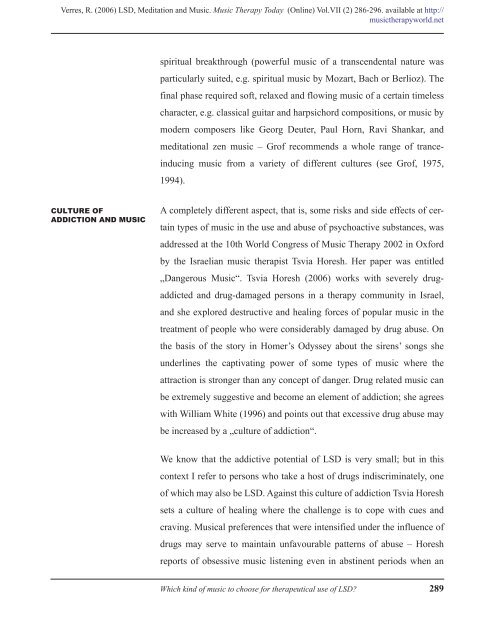Music Therapy Today - World Federation of Music Therapy
Music Therapy Today - World Federation of Music Therapy
Music Therapy Today - World Federation of Music Therapy
You also want an ePaper? Increase the reach of your titles
YUMPU automatically turns print PDFs into web optimized ePapers that Google loves.
Verres, R. (2006) LSD, Meditation and <strong>Music</strong>. <strong>Music</strong> <strong>Therapy</strong> <strong>Today</strong> (Online) Vol.VII (2) 286-296. available at http://<br />
musictherapyworld.net<br />
CULTURE OF<br />
ADDICTION AND MUSIC<br />
spiritual breakthrough (powerful music <strong>of</strong> a transcendental nature was<br />
particularly suited, e.g. spiritual music by Mozart, Bach or Berlioz). The<br />
final phase required s<strong>of</strong>t, relaxed and flowing music <strong>of</strong> a certain timeless<br />
character, e.g. classical guitar and harpsichord compositions, or music by<br />
modern composers like Georg Deuter, Paul Horn, Ravi Shankar, and<br />
meditational zen music – Gr<strong>of</strong> recommends a whole range <strong>of</strong> trance-<br />
inducing music from a variety <strong>of</strong> different cultures (see Gr<strong>of</strong>, 1975,<br />
1994).<br />
A completely different aspect, that is, some risks and side effects <strong>of</strong> cer-<br />
tain types <strong>of</strong> music in the use and abuse <strong>of</strong> psychoactive substances, was<br />
addressed at the 10th <strong>World</strong> Congress <strong>of</strong> <strong>Music</strong> <strong>Therapy</strong> 2002 in Oxford<br />
by the Israelian music therapist Tsvia Horesh. Her paper was entitled<br />
„Dangerous <strong>Music</strong>“. Tsvia Horesh (2006) works with severely drug-<br />
addicted and drug-damaged persons in a therapy community in Israel,<br />
and she explored destructive and healing forces <strong>of</strong> popular music in the<br />
treatment <strong>of</strong> people who were considerably damaged by drug abuse. On<br />
the basis <strong>of</strong> the story in Homer’s Odyssey about the sirens’ songs she<br />
underlines the captivating power <strong>of</strong> some types <strong>of</strong> music where the<br />
attraction is stronger than any concept <strong>of</strong> danger. Drug related music can<br />
be extremely suggestive and become an element <strong>of</strong> addiction; she agrees<br />
with William White (1996) and points out that excessive drug abuse may<br />
be increased by a „culture <strong>of</strong> addiction“.<br />
We know that the addictive potential <strong>of</strong> LSD is very small; but in this<br />
context I refer to persons who take a host <strong>of</strong> drugs indiscriminately, one<br />
<strong>of</strong> which may also be LSD. Against this culture <strong>of</strong> addiction Tsvia Horesh<br />
sets a culture <strong>of</strong> healing where the challenge is to cope with cues and<br />
craving. <strong>Music</strong>al preferences that were intensified under the influence <strong>of</strong><br />
drugs may serve to maintain unfavourable patterns <strong>of</strong> abuse – Horesh<br />
reports <strong>of</strong> obsessive music listening even in abstinent periods when an<br />
Which kind <strong>of</strong> music to choose for therapeutical use <strong>of</strong> LSD? 289

















